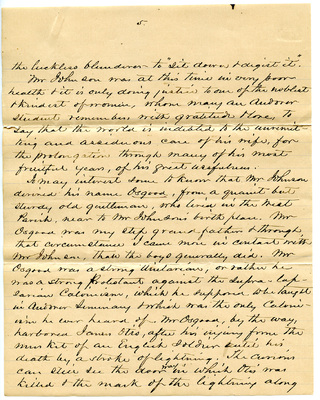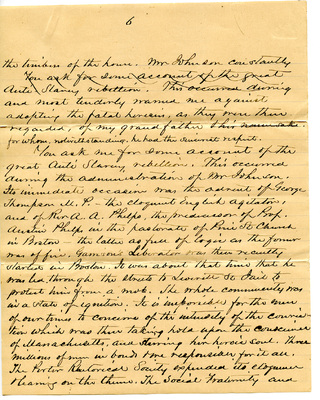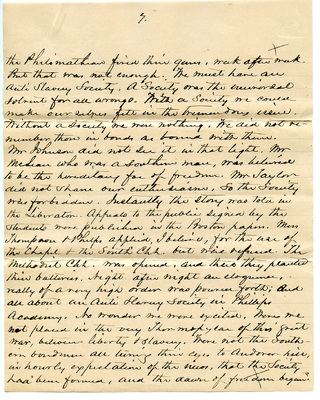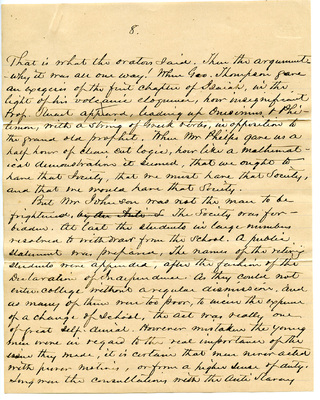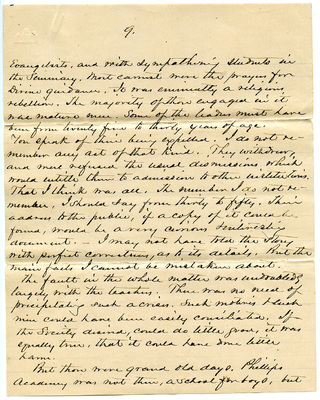Pages
Gulliver18780527_005
the luckless blunderer to "sit down & digest it." Mr Johnson was at this time in very poor health & it is only doing justice to one of the noblest & kindest of [?], whom many an audorer student remembers with gratitude alone, to say that the world is indebted to the unremit ting and assiduous care of his [?], for the prolongation through many of his most fruitiful years, of his great usefulness. It may interest some to know that Mr Johnson divined his name Osgood, from a guauit but sturdy old gentleman, who lived in the Mist Parish, near to Mr. Johnson's birthplace. Mr Osgood was my step grand father & through, that circumstances I came more in contact with Mr Johnson, than the boys generally did. Mr Osgood was a strong Unitarian, or rather he was a strong Protestant against the dufurna-laplarian Calvinism, which he supposed who taught in Andover Seminary & which ran the only Calvini sm he ever heard of. Mr Osgood, by the way, harborer James Otis, after his inquiry from the [?] kit of an English solider [?] his death by a stroke of lightning. The [?] can stir see the door may which Otis' man killed & the mark of the lightning along
Gulliver18780527_006
the timber of the house. Mr. Johnson constantly... [You ask for some account of the great Anti-Slavery rebellion.] This occurred during and most tenderly named me against adopting the fatal [kinesis?], as they were there regarded, of my grandfather this namesake. for whom, notwithstanding, he had the sincerest respect. You ask me for some account of the great Anti Slavery rebellion. This occurred during the aministration of Mr Johnson. Its immediate occasion was the advent of George Thompson U. P. - the eloquent English agitation, and of Rev. A. A. Phelps, the predecessor of Prof. Austin Phelps in the pastorate of Pric. St. Church in Boston - the latter as full of logic as the former man of fire. Garrison's Libertor was there recently started in Boston. It was about that time that he was led through the streets to [Livenette] St Jail to protect him from a mob. The whole community was in a state of ignition. It is impossible for the [mere?[ of our times to conc[?] of the intensity of the commo tion which was then taking hold upon the con[?] of Massachusetts, and starring her heroic soul. Three millions of men in bond the repercussion for it al all. The Porter Rhetorical Society expindid its eloquent Hearing on the theme. The Social Fraternity and
Gulliver18780527_007
the Philomathean fired their guns, week after week. But that was not enough. We must have an Anti Slavery Society. A Society was the [universal?] solvent for all wrongs. With a Society we could make ourselves full in the tremendous issue. Without a Society we were nothing. We did not remember those in bonds as bound with them. Mr Johnson did not see it in that light. Mr Median who was a Southern man, was believed to be the hereditary for of freedom. Mr Taylor did not share our enthusiasm. So the Society was forbidden. Instantly the story was told in the Liberator. Appeals to the public signed by the students were published in the Boston papers. Mr Thompson & Phillips applied, I believe, for the use of the Chapel & the South Chh. but were refused. The Methodist Chh. was opened, and that they planted their batteries. Right after might an eloquence, really of a very high order was pounced forth; And all about an Anti Slavery Society in Philips Academy. [No wonder?] me more excited. Were ee not placed in the very than mopylar of this great war, between and slavery. Were not the Southern boundmen all lining their eyes to Andover hill, in hourly expectation of the nicor, that the Society had been formed, and the dawn of freedom began?
Gulliver18780527_008
That is what the orator siad. Then the arguments - why it was allone way! When Geo. Thompson gave an [?] of the first chapter of Isaiah, in the light of his volcanic eloquence, how insignificant Prof. Stuart appeared, leading up On[?] & Phi lemon, with a string of Greek words, in opposition to the grand old prophet. Then Mr Phelps gave us a half hour of clear cut logic, how like a maltimal -ical a ammoustration it seemed, that we ought to have that Society, that we must have that Society, and that we would have that Society.
But Mr. Johnson was not the man to be frightened, The Society was for bidden. At last the students in large numbers resolved to withdraw from the school. A public statement was prepared, The names of the retiring students were appended, after the fashion of the Declaration of Independence. As they could not enter college without a regular dismission, and as many of them were too poor to weir the express of a change of school, The act was really one of great self-denial. However mistaken the young men were in regard to the real importance of the [?] they made, it is certain that [?] never acted with poorer motives, or from a higher sense of duty. Long mar the constellation with the Anti Slavery
Gulliver18780527_009
Evangelists, and with dyrepatheriy? students in the Seminary. Most cannot move the prayer for Divine guidance. To man emminently a religion rebellion. The Majority often engaged in it w[?] mature [?]. Some of the leaders must have been from twenty five to thirty years of age. You speak of their being expelled. I do not remember any act of that kind. They withdrew, and [?] refused the usual dismissions, which would [?] them to admission to other institutions. That I think was all. The number I as not remember, I should say from thirty to fifty. Their address to the public, if a copy of it could be found, would be a very curious interesting document. _ I may not have told the story with perfect correctness, as to its details. But the main facts I cannot be mistaken about. The fault in the whole matter was undoubtedly largely with the teachers; Ther was no need of precipitating such a crisis. Such motives & such miu? could have been easily couciliated. If the Society disind, could do little good, it was equally true, that it could have done better harm. But thse were grand old days. Phillips Academy was not then, a school for boys, but
